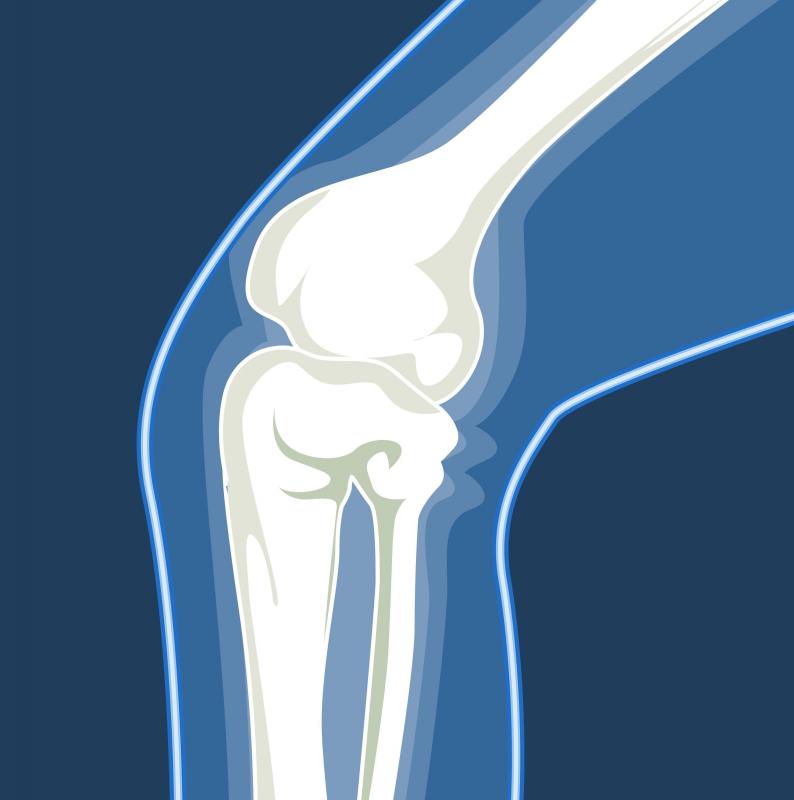At WiseGEEK, we're committed to delivering accurate, trustworthy information. Our expert-authored content is rigorously fact-checked and sourced from credible authorities. Discover how we uphold the highest standards in providing you with reliable knowledge.
How can I Manage Gout of the Knee?
The best to manage gout of the knee is to take appropriate medications, get down to a healthy weight if you aren't already, and consider taking natural supplements to help with symptoms. You may also want to eat plenty of foods high in calcium and vitamin D to promote healthy joints, exercise regularly, and avoid activities or clothing which may be hard on the knees. Since gout is caused primarily by the buildup of uric acid, you should avoid foods which contain high levels of this substance.
Gout is a type of arthritis which causes an accumulation of uric acid crystals in the joints. It can cause debilitating pain and occasionally loss of mobility. Sometimes water on the knee may become a problem and requires immediate treatment.

One of the best known and most widely used methods to manage gout of the knee is the use of prescription medications. This may be effective for many patients, although not all forms of gout are responsive to medication. Talk to your doctor and have additional tests done to determine which type of prescription may benefit your condition.
There are also natural remedies used to manage gout of the knee. For instance, vitamin C has been shown to aid the body in getting rid of uric acid. Certain supplements, such as black currant oil, white mulberry, and celery extract, may help uric acid out of the body through the kidneys and digestive tract. Although these methods are considered safe for most individuals, it is a good idea to speak with your doctor or health care professional before starting a new supplement regimen.

You can also help manage gout of the knee by avoiding certain foods which may exacerbate symptoms by increasing uric acid in the body. These can include most meats, shellfish, and alcohol. These foods should be eaten in moderation anyway because they are also high in fat and calories.
Exercise is also important in the management of gout. Not only will it help strengthen your joints, bones, and muscles, but it will also help you to lose any unwanted weight. Excess weight puts too much strain on the bones and joints and can often to lead to worsened symptoms of gout and other forms of arthritis.

Remember to avoid activities which may put too much strain on your knees. Stick to low-impact exercises like swimming or walking and avoid things like jumping jacks or running. Wear appropriate shoes that effectively support the arch and heel. Do not wear shoes with high heels, as these can wreak havoc on the knees, back, and legs.
AS FEATURED ON:
AS FEATURED ON:















Discussion Comments
Black cherry extract and celery seed extract are excellent for symptoms of gout in the knee. I've been using them for a few years to prevent gout attacks and they work.
Stronger treatments are required during gout attacks, but these herbal remedies are great for maintenance.
@ZipLine-- I'm on a medication to prevent uric acid production.
First of all, you can't take this group of drugs during an ongoing gout flare-up. So forget about using them to relieve pain. For immediate pain relief, anti-inflammatory medications, pain relievers (no aspirin) and a cold pack will help. You can try topical knee pain remedies like camphor. A daily, Omega 3 supplement will help as well.
Hyperuricemia medications are good for long-term uric acid prevention. But they have to be taken regularly for a long time. They also tend to cause more flare-ups and more pain in the beginning of treatment.
Does anyone here have gout of the knee and take hyperuricemia medications to get rid of uric acid crystals in the body? What is your opinion on them? Do they relieve knee pain symptoms immediately?
Post your comments